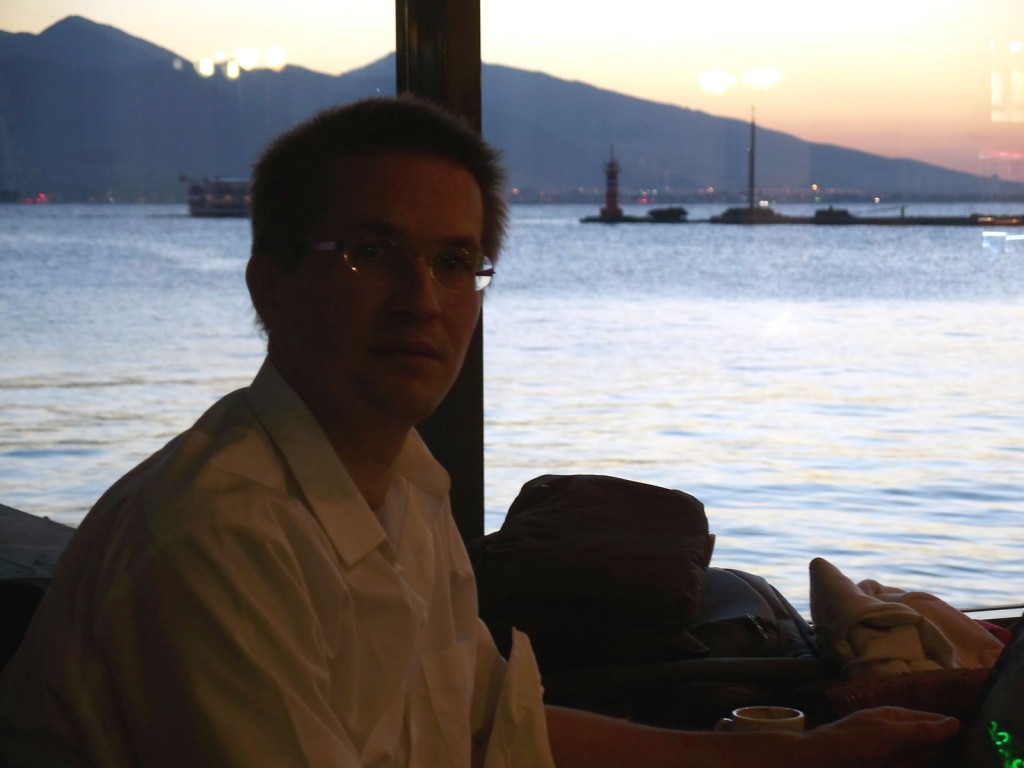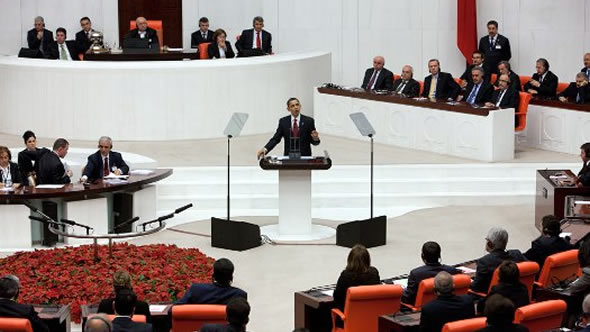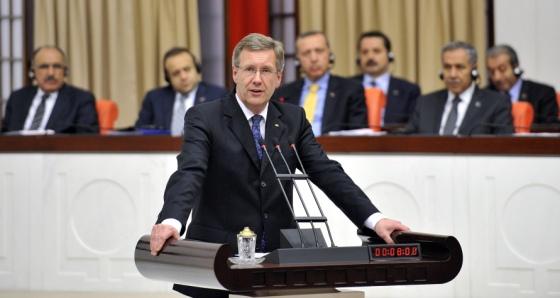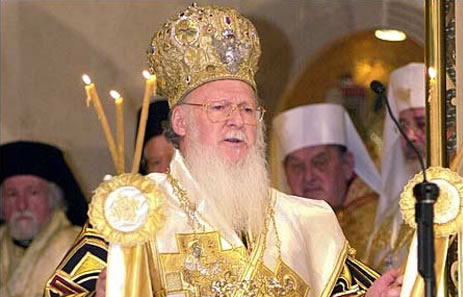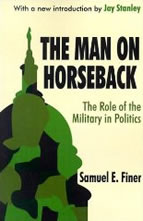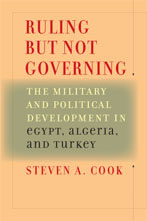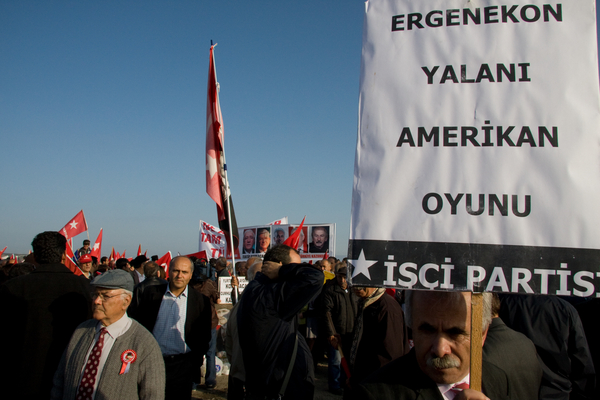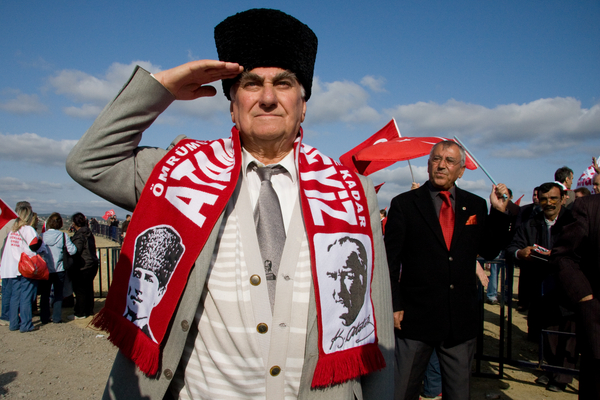Below is the short version of a presentation I gave in Amsterdam at the invitation of the Turkish Institute (The Hague) about Turkish foreign policy.
Is Turkey’s Balkan policy today inspired by a post-modern vision of the world?
A pre-modern one? And does it matter how we call it?
On 16 October 2009 Turkish Foreign Minister Ahmet Davutoglu gave a presentation in Sarajevo, the capital of Bosnia-Herzegovina. It was a remarkable speech and a good starting point to understand the outlook of the people making Turkish foreign policy today. It also raises important question about the future of both Turkish foreign and domestic policy.
Davutoglu notes, first, that the destiny of the Balkan region is to be “either a story of success or a story of failure”: “either the Balkan region will be the center of everything or it will be the victim of everything.” Next, Davutoglu notes, the one time in history when the Balkan region was not a victim of history was under the early Ottoman Empire:
“the Balkan region became the center of world politics in the 16th century. This is the golden age of the Balkans. I am not saying this because we inherited the Ottoman legacy, but this is a historical fact. Who ran world politics in the 16th century? Your ancestors. They were not all Turks, some were of Slav origin, some were of Albanian origin, some were even converted Greeks, but they ran world politics. So, Mehmet Pasha Sokolovic is a good example. If there was no Ottoman state, Mehmet Pasha would be a poor Serb who lived just to have a small farm. At that time there was no developed farm in that part of the world. But because of the Ottoman legacy he became a leader of world politics.”
Davutoglu reminds his audience that in Ottoman times Salonika was a thriving trade center. Ottoman Belgrade was a pivotal center on the Danube with “hundreds of mosques and churches.” And then there was Sarajevo: “Sarajevo is a miracle, like the miniature version of this heritage. If you understand Sarajevo you can understand all of Ottoman history.”
Davutoglu’s speech concludes with the promise that the golden age of the Balkans can be recaptured:
“Like in the 16th century, which saw the rise of the Ottoman Balkans as the center of world politics, we will make the Balkans, the Caucasus and the Middle East, together with Turkey ,the center of world politics in the future. This is the objective of Turkish foreign policy, and we will achieve this. We will reintegrate the Balkan region, the Middle East and the Caucasus, based on the principle of regional and global peace ,for the future, not only for all of us but for all of humanity.”
It is this claim which has alarmed some audiences. Is this a messianic call for a new Turkish imperialism? Is this a cover for a hidden Islamist expansionism? One of the 2009 cables from the US embassy in Ankara refers to this speech as an illustration of a dangerous (and Islamist) foreign policy. Turkey’s Balkan policy is pursued, the cable reads,
“… with Rolls Royce ambitions but Rover resources, to cut themselves in on the action the Turks have to “cheat” by finding an underdog like Haris Silajdzic, [the former Bosniak member of the presidency of Bosnia and Herzegovina].”
“The leaked memo explains that for the neo-Islamic AKP ruling party in Turkey, this new approach provides a relatively low cost and popular tool to demonstrate influence, power, and the “we’re back” slogan, for the Turkish public … This “back to the past” attitude so clear in Davutoglu’s Sarajevo speech, combined with the Turks’ tendency to execute it through alliances with more Islamic or more worrisome local actors, constantly creates new problems.”
In fact, Davutoglu does promise his audience in Sarajevo that a new golden age can be reached by “reinventing the Ottoman legacy”:
“People are calling me neo-Ottoman, therefore I will not refer to the Ottoman state as a foreign policy issue. What I am underlining is the Ottoman legacy. The Ottoman centuries of the Balkans were success stories. Now we have to reinvent this.”
But what, in his speech, is the actual strategy to achieve this Balkan revival? Is it the recreation of an alliance of Muslim countries – a vision so much feared in Greece in the early 1990s? Is this a call for neo-Ottoman imperialism, which would most likely trigger counter-alliances, splitting the Balkans along religious lines or competing axes? What is the “spirit of the Balkans” that the region needs to rediscover in Davutoglu’s view and what are the tools that he recommends to do so?
It is here that one gets to the most interesting part of the speech, and it is one that the US cable seems to miss entirely. In order to experience another golden age, Davutoglu tells his audience, the Balkans must “create a new multicultural co-existence through establishing a new economic zone.” He then explains in detail the true secret of historical greatness:
“Multicultural existence is very important because the rise of a civilisation can only be understood through analysing the urban structures and the cultural life in cities. If a city is uniform it means that civilisation is not so diversified. It is an inward looking, closed society. Before there was a Roman Empire, the city of Rome was only inhabited by Romans. But later, when the Roman Empire was established Rome became a cosmopolitan city. Similarly, Istanbul and all other Balkan cities used to be multicultural. We lived together, and because of this strong cultural richness there was an increase in interaction.”
This is a remarkable interpretation of South East European history to be offered by a Turkish foreign minister. The history of the early Turkish Republic was shaped by the memories of the tragic decades of the collapsing Ottoman state. As Eric Zurcher has shown so well, the early Turkish Republic was constructed by people from the Balkans and from Istanbul (there were very few Anatolians among the elite in the first decades of the Republic). The construction of the Kemalist state reflected the traumatic experience of a disastrous failure, the notion that a diverse, multicultural, society (such as the late Ottoman Empire) was an impossibility, that multiculturalism, to use a modern term, was doomed to failure. So the young Turks came to embrace the ideology of nationalism, like other peoples of the Balkans had done before them. The founders of the republic also pushed for the exchange of populations in peace negotiations with Greece in 1923. As one member of the Turkish delegation in Lausanne, Riza Nur, wrote in his memoirs:
“The most important thing was the liberation of Turkey from elements which, through the centuries, had weakened her either by organising rebellions or by being the domestic extensions of foreign states. Hence making the counntry uniformly Turkish … was a huge and unequalled responsibility.”
It was a national(ist) vision that continued to shape policy towards minorities (including Christians) in Turkey until today (see here). For Davutoglu, however, what first comes to mind when thinking about the destruction of multiethnicity in the Balkans are (recent) war crimes:
“Those who carried out the massacres in Srebrenica are barbaric people, who did not tolerate cultural differences. The spirit of Sarajevo is a spirit of coexistence, the spirit of living together. So how does Turkey look at the Balkans? We want to see a new Balkan region, based on political dialogue, economic interdependency and cooperation, integration and cultural harmony and tolerance.”
The vision of an interdependent South East Europe, on the other hand, is consistent with earlier writings of Davutoglu. In 2001, Davutoğlu authored “Strategic Depth” (Stratejik derinlik: Türkiye’nin uluslararası konumu), as he was about to move from academia into a job as chief foreign policy advisor to Prime Minister Recep Tayyip Erdoğan.
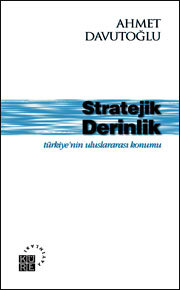
“Strategic Depth”
In Davutoğlu’s book the arguments in favour of a renewed relationship between Turkey and it near-abroad are laid out in full. During the Cold War, Turkey’s geopolitical influence was used as a trump of the Western Block, writes Davutoğlu. After the fall of the USSR it was necessary to re-interpret Turkey’s geopolitical role, “overcoming the strategy of conserving the status quo … In this understanding Turkey has to redefine its position … and gain a new understanding within the international framework.” Turkey’s new geopolitical position, he argues, “has to be seen as a means of gradually opening up to the world and transforming regional into global influence:”
“In fact, Turkey is both a European and Asian, Balkan and Caucasus, Middle Eastern and Mediterranean country.”

Photo: Emil Sanamyan (Armenian Reporter)
Davutoğlu’s book offers a first articulation of what was to become the AKP government’s “zero problems with neighbours” doctrine.
“It is impossible for a country experiencing constant crises with neighbouring states to produce a regional and global foreign policy … Relations with these countries have to be detached from the long and difficult process involving polities and bureaucrats. A broader basis, focused largely on intra society relations, including economic and cultural elements, must be found … A comprehensive peace plan and a package to develop economic and cultural relations have to be put into place simultaneously to overcome security crises with the closest neighbours.”
Looking to the Caucasus and the Middle East, regions with authoritarian regimes, he stresses the power of functional integration:
“Particularly in our region, where authoritarian regimes are the norm, improving transport possibilities, extending cross-border trade, increasing cultural exchange programs, and facilitating labour and capital movement … will help overcome problems stemming from the role of the central elites.”
Increase trade relations, remove (visa) barriers to freedom of movement between people, privilege soft power, emphasize a common history … such have been the core principles of Turkish foreign policy, not only towards Syria and Iraq but also towards Georgia, Russia or Greece (for more on Davutoglu and others writing on this see the ESI picture story on Turkish Foreign Policy). This is not the most spectacular part of Turkey’s foreign policy (unlike the much hyped mediation efforts, or the much denounced fall-out with Israel) but it may well be the most important in the long term.It also appears sustainable, reflecting the interests of what Kemal Kirisci has called in his essay the foreign policy of Turkey as a “trading state”.
What is striking in Davutoglu’s approach is its interpretation of history: the key reference point is not the agonising experience of the (painful, particularly in the Balkans) creation of nation states but the confident memory of a multi-ethnic Empire. It is a memory that inspires the belief that policies of integration can work, that multiethnic, multireligious cities are signs of progress, expressions of the success of a civilisation, and not of its vulnerability or failure. In late Ottoman Istanbul 40 percent of the population were Christians. In late Ottoman Salonika the largest population group were Sephardic Jews.
Ironically, this approach when applied to the Balkans also supports an escape from the burdens of recent history. In another speech in Sarajevo in December 2009 Davutoglu tells his audience that the Balkans are
“a region of immense history, rich culture and, I believe, a great common future. Naturally, one cannot forget the tragedies of the recent past. Indeed, we should bear in mind the sufferings of the last two decades, in order to ensure that they are never allowed to happen again. However, we cannot live with these tragedies in mind forever. We must move on and the Balkans has moved on.”
Neither the memories of the tragedies of the early nor those of the end of the 20th century should hold the region and its people hostage.
Now many are likely to question this post-modern interpretation of Ahmet Davutoglu’s commitment to multi-culturalism. For Balkan skeptics this approach is not post– but pre-modern, a barely veiled appeal to what in the end is a religious community (the Ottoman millet or the Islamic umma) to replace modern national identities. As one Albanian commentator noted, claims by Turkish officials that Albanians and Turks belong to “one nation” are troubling:
“What nation? Because according to any universally accepted definition of the nation, Turks and Albanians cannot be one nation. Unless, that is, we substitute the modern concept of the nation, with the concept of the milet of Ottoman times, when the inhabitants of the empire were not divided according to their ethnicity, but were classified according to their religion, thus including Albanians of the Muslim faith in the same millet as Turks, Chechens, Arabs, etc, and those of the Orthodox faith in the so-called Rom millet alongside Greeks, Serbs, Bulgarians and so on.”
In this view Europeanisation is a process that moves Albania in a more or less straight line away from the multiculturalism of the Ottoman period, through the modern nation-state, to European integration. In the case of Albania, Piro Misha notes, the Ottoman legacy is part of a past that must be left behind. It cannot serve as an inspiration for the future:
“Allow me to add that the reason why integration into NATO and the EU is of such historical importance for the Albanian Europhile elites, is not simply related to considerations about the country’s economic development or security, but is also related to the fact that (in their eyes) this integration will make the country’s march towards Europe practically irreversible, thus eliminating once and for all the fear of sliding back into the past. This is the reason why every step taken in this direction constitutes a step away from the influence of the Ottoman legacy, much in the same way as we are moving away with every passing year from the influence of the much shorter period of Enver Hoxha’s rule.”
Here, then, is the key question for the future of Davutoglu’s project in the Balkans: can Turkey reassure the people in the Balkans who reject the nationalist visions of the early 20th century and have instead embraced the post-modern vision of a European Balkan, integrated in a region without borders under the roof of a European Union of (relatively) tolerant and (more or less) pluralistic nation-states? (Note that this is a European Union which is having to cope with the fact that as a result of decades of successful trade and peace and freedom of movement its cities – London, Paris, Vienna, Berlin – are indeed multireligious, again!) Can Turkey’s leaders present Ankara’s vision of interdependence as not only not in competition but as compatible and even complementary to the other integration project ongoing in the Balkans today – the project of European enlargement?
There are three obvious things which those who are both fascinated and confused by the new Turkish approach might watch as they try to figure out how much post- and how much pre-modern ingredients are wrapped up in Davutoglu’s appeal to restore a new Balkan spirit:
The first is the ongoing transformation of Turkey itself. Depending on how Turkey develops, economically, socially and in terms of accepting its own pluralism, its experience will either serve as an inspiration or as a threat. Central to this will be the question whether Turkey actually comes to terms with its own minorities: whether it is able to accept Turkish Christians as full citizens; whether it will allow the opening of the Orthodox Seminary in Halki; whether it will translate the vision, once sketched by Erdogan, of an upper civic identity (ust kimlik) based on Turkish citizenship coinciding with a lower identity (alt kimlik) based on ethnicity, religion or any other criteria people might chose, into a viable model.
A Turkish state at conflict with its own citizens of Greek, Armenian, Kurdish, Arab origin cannot in the long term inspire confidence among its neighbours. Recent years have certainly seen some encouraging trends (more in upcoming ESI reports). I have seen many a Balkan visitor expecting to find a country in the throes of an Islamic revival, having read the accounts of Turkey sceptics based in the US or in Ankara itself, struck by the vibrant and open society they find when they visit Istanbul, Ankara or the coast.
Of course, people in (highly secularized) Balkan societies will also watch closely whether Turkey is moving towards a more religious or simply a more pluralist model of society; one in which religion (including Islam) might well be practiced more openly than before, but in which secular lifestyles will also be able to thrive.
The second vital issues is how Turkey’s relationship with its immediate (and Christian) Balkan neighbours will develop. If Turkey and Greece actually succeed in turning the Aegean into a sea of peace (and if current talks on the Aegean lead to positive results that allow further progress); if Turkey and Serbia continue to develop their relations; and if Turkey manages to reach out to all communities in Bosnia (and not only the Bosniaks or even a part of them) it will be impossible to question the positive impact of its more active Balkan policy for the whole region.
The third issue to watch concerns another vision of ongoing integration, one which Davutoglu did not mention in Sarajevo, but which has been central to Turkey’s own developments since 1999: the process of EU integration. For in reality it is this – the idea of all of South Eastern Europe and Turkey eventually joining the EU – which holds out the only credible path to actually realise the post-modern promise inherent in Davutoglu’s vision of multiethnic open cities and societies linked in peaceful commerce.
It was EU integration and enlargement that recreated such an open and integrated space in Central Europe in the past 20 years, not neo-Habsburgianism or political visions of Mitteleuropa. It was ideas of functional integration under a common European roof that transformed the Baltics in the past two decades, not nostalgia for the Hanseatic league or the age of Swedish imperialism. If Ahmet Davutoglu would have made a reference to the process of EU-integration – one that in fact today affects all of South East Europe (including Turkey) – in his Sarajevo speech this would have gone some way towards reassuring Balkan skeptics.
But even in its absence, the reality is that a commitment to a policy of interdependence and integration, a policy that promises to look to the future rather than to the bitter (recent) past, is a novel and promising approach to come from Ankara. If this translates into support for pluralism and multiculturalism inside Turkey it will be all the more credible outside. Then a new golden era – in Turkey and in the Balkans – is indeed possible, and even skeptical Balkan citizens might not begrudge Ahmet Davutoglu’s references to a golden age of Ottoman tolerance and economic integration … .
(it is not only myth, of course: read here about late Ottoman Izmir/Smyrna. Or the account by Gabriel Arie, director of the school set up by the Alliance Israelite Universelle in Izmir, in 1893, who had come from Bulgaria: “What strikes a Bulgarian when he enters Turkey is, before everything else, the air of freedom that one breathes.” (quoted in Andrew Mango’s biography of Ataturk). Of course, there is enough material to also support the counter-myth of the late Ottoman state as a repressive prison for its various people; an all-too familiar story for those in the Balkans who grew up with the theory of the Turkish yoke as the source of all evil – but honestly, which reference would you want policy makers to refer to more when talking about the future: the memories of Moorish Cordoba or those of the crusading Spain of Phillip II?).
For more on these issues see also these entries:
- Translating cultures in Al-Andalus
- “Multikulti is dead” and other ideas which are bad for the Balkans
- And on the real history of Sarajevo see the ESI picture story based on Robert Donia’s Book.
- Finally, for all those interested in the work of Eric Zurcher, perhaps the leading authority today on modern Turkish history, I also recommend this article, available online, on the Ottoman Empire from 1855 to 1922: inevitable failure?
Reading this today also suggests that without a strong economic base (in Turkey) all notions of future regional influence are bound to be pipe-dreams. Even for the late Ottoman Empire it was in the end the economy (and demography) stupid …
Zurcher’s conclusion:
“The reasons for the Ottoman Empire’s ultimate failure to sustain its viability thus are manifold. It lacked the manpower, the money and the industrial base to compete successfully with European powers. The prerogatives of the European states under the system of Capitulations severely limited its room for manoeuvre in the economic sphere. The religiously over determined division of labour between a vastly increased state apparatus, dominated by Muslims and a modern industrial and commercial sector completely dominated by Christians under foreign protection meant that economic growth could hardly be tapped by the state to increase its resources. At the same time the explosive growth of the number of protected Christians and of their wealth created the social and cultural space in which separatist nationalisms could blossom. By the time the Ottoman elite tried to counter these with emotional appeals to a shared Ottoman citizenship and patriotism in the 1860s, it was already too late. Sultan Abdülhamid’s emphasis on the Islamic character of the state during his rule in the 1880s and 1890s served to further alienate the non-Muslims. The Young Turk movement, which emerged in the 1890s and held power between 1908 and 1918, was born out of a Muslim reaction against the perceived failure of the sultan’s regime to stop the weakening of the Ottoman state and the encroachments of foreigners and local Christians. When external circumstances gave them the opportunity to act independently, identity politics, or solving the ethnic issue, took priority over increasing the financial and human resources of the state.”

